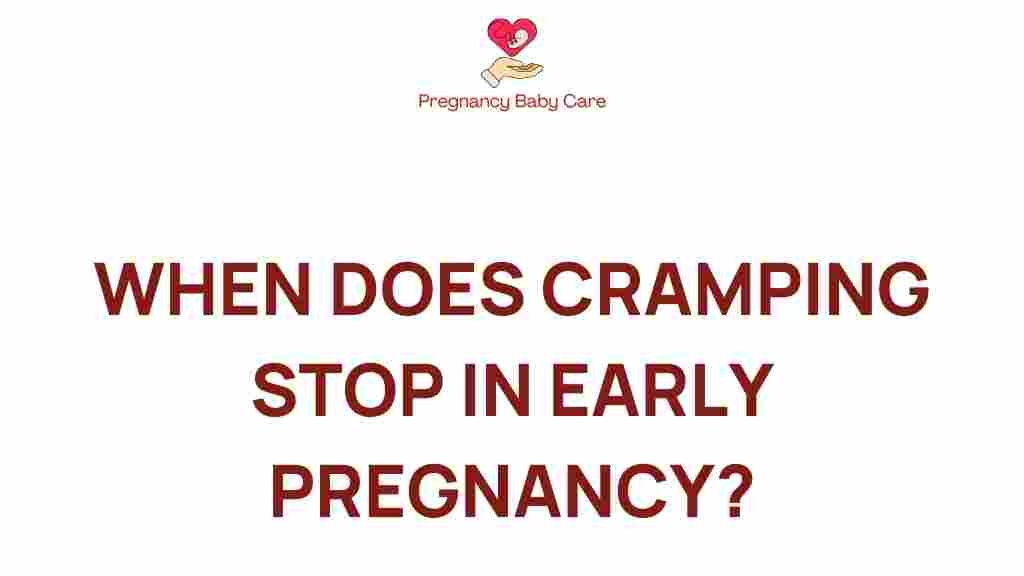Understanding When Cramping Stops in Early Pregnancy
Experiencing cramping during early pregnancy is a common concern among many women. As the body undergoes significant changes to support the developing embryo, discomfort can arise. Understanding when cramping stops in early pregnancy is essential for expectant mothers to differentiate between normal pregnancy symptoms and signs that may require medical attention. In this article, we will explore the causes of cramping, what to expect in the first trimester, and helpful tips for managing discomfort during this exciting yet challenging time.
What Causes Cramping in Early Pregnancy?
Cramping in early pregnancy can be attributed to various factors, including:
- Implantation: When the fertilized egg attaches itself to the uterine wall, some women may experience mild cramping.
- Uterine Expansion: As the uterus grows to accommodate the developing fetus, stretching can cause discomfort.
- Hormonal Changes: Increased levels of hormones such as progesterone can lead to cramping.
- Gas and Bloating: Early pregnancy often comes with digestive changes that can cause cramps.
While cramping is typically normal, it’s essential to monitor the intensity and duration of the discomfort.
What to Expect in the First Trimester
The first trimester is a time of rapid development and significant hormonal changes. Here’s what you can expect regarding cramping and other pregnancy symptoms:
- Week 1-4: Many women may experience mild cramping akin to menstrual cramps. This is often due to implantation.
- Week 5-8: Cramping may continue, sometimes accompanied by nausea, fatigue, and breast tenderness. Discomfort can vary in intensity.
- Week 9-12: As the body adjusts, cramping may decrease. However, some women still experience occasional discomfort.
In most cases, cramping in early pregnancy should subside by the end of the first trimester. However, if cramping is severe or accompanied by other concerning symptoms, such as heavy bleeding, it is crucial to seek medical advice.
Signs of Normal vs. Concerning Cramping
It’s essential to distinguish between normal cramping and signs that may indicate a problem. Here’s a quick guide:
- Normal Cramping:
- Mild to moderate intensity
- Short duration (a few hours to a couple of days)
- No heavy bleeding or passing of tissue
- Concerning Cramping:
- Severe pain
- Persistent cramping that worsens
- Accompanied by heavy bleeding, fever, or chills
If you experience any concerning symptoms, contact your healthcare provider immediately.
Managing Discomfort in Early Pregnancy
While some cramping is normal, there are several health tips to manage discomfort effectively:
- Stay Hydrated: Drink plenty of water to help reduce bloating and cramping.
- Rest: Allow your body to rest and recuperate, especially if you feel fatigued.
- Gentle Exercise: Engage in light activities such as walking or prenatal yoga to improve circulation.
- Warm Compress: Applying a warm compress to the lower abdomen can relieve cramping.
- Healthy Diet: Eat a balanced diet rich in fruits, vegetables, and whole grains to support maternal health.
Always consult with your healthcare provider before starting any new exercise or dietary regimen. Maintaining open communication with your healthcare team is vital during early pregnancy.
When to Seek Medical Attention
While most cramping is normal, there are specific situations where seeking medical attention is essential. Consider contacting your healthcare provider if you experience:
- Severe abdominal or pelvic pain
- Heavy vaginal bleeding
- Cramping that lasts more than a few days
- Signs of an ectopic pregnancy (sharp pain on one side, dizziness, fainting)
Your healthcare provider can perform an evaluation and provide the necessary care to ensure your health and the health of your baby.
The Importance of Prenatal Care
Regular prenatal care is crucial for monitoring the health of both mother and baby. During your visits, your healthcare provider will:
- Check for any signs of complications
- Provide advice on managing pregnancy symptoms
- Monitor fetal development through ultrasounds and other tests
Establishing a routine with your healthcare provider early in pregnancy helps ensure that you receive personalized care tailored to your specific needs.
Conclusion
Understanding when cramping stops in early pregnancy can help you navigate the first trimester with confidence. While mild cramping is typically a normal part of early pregnancy, it’s essential to be aware of your body and recognize concerning symptoms. By following health tips, managing discomfort, and maintaining regular prenatal care, you can promote maternal health and ensure a healthy pregnancy journey.
For more information about pregnancy health and prenatal care, visit this helpful resource. Always reach out to your healthcare provider with any questions or concerns regarding your pregnancy symptoms.
By staying informed and proactive, you can focus on the joy of bringing new life into the world.
This article is in the category Pregnancy and created by PregnancyBabyCare Team
